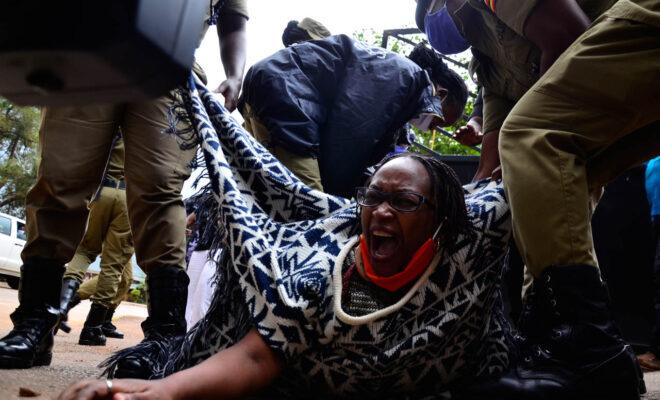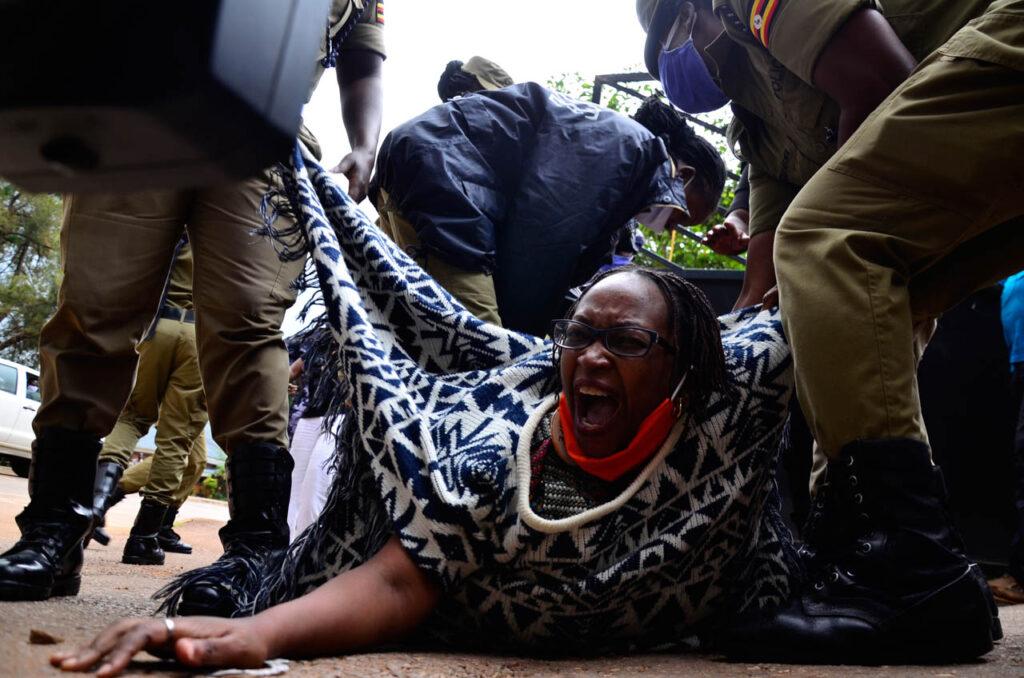Registers of radical activism in Africa

Anything short of radical revolutionary activism, which we explore in this new series, will neither liberate us Africans nor redeem our continent.

Female police officers drag prominent Stella Nyanzi to a police van in Kampala in May 2020. Credit: Abubakar Lubowa/Ugandan Press Photo Award (UPPA).
This article is part of the Radical Activism in Africa special series, guest edited by Stella Nyanzi.
The spark for radical activism in Africa is varied. #RhodesMustFall in South Africa began after Cape Town student Chumani Maxwele flung poo on a statue of Cecil Rhodes. The Tunisian Revolution, which led to the Arab Spring, started after street vendor Mohamed Bouazizi set himself on fire after corrupt officials confiscated his goods. In Sudan, it was the steep hike in bread prices that triggered the movement that removed the long-term president Omar al-Bashir. In Zimbabwe, it was Pastor Evan Mawaire denouncing the government’s failings while draped in the national flag that prompted widespread protests.
The groups leading this activism can be just as diverse. In Liberia, the mass peace movement was mainly organised by women. In Nigeria, the #EndSARS protests were mobilised by young people. In Uganda, demonstrations have been led by ghetto youths inspired by a musician-turned-legislator.
Whatever the catalyst or method, Africa urgently needs resistance through radical activism. Mothers must discover recipes of effective revolutionary action to feed the bellies, inspire the minds, and sharpen non-violent fighting spirits. Fathers must hand down exemplary legacies of disrupting the status quo to return power to the masses. Every able African must (of necessity) work towards dismantling the power bases of those that oppress, plunder and exploit any and all in society. Anything short of radical revolutionary activism will neither liberate us Africans nor redeem our continent of Africa!
Radical activism must not be confused with the indiscriminate violence of “radicalisation”, which involves extreme militarism and a total disregard for human rights, peace, and justice. Rather, radical activism refers to advocacy aimed at changing the roots upholding unjust structures of power in order to end oppression, violence, and assaults on human rights. The targets of this activism are highly diverse and range from racism, homophobia and Islamophobia, to capitalist exploitation, imperialism, corruption, authoritarianism, environmental degradation and much more. Radical activists, however, go further than just criticising existing systems, institutions, and relations; they must also have a vision and a plan for establishing a new social order which will right former wrongs.
While I self-identify as a radical African queer feminist scholar and creative non-violent activist, others have variously called me a “radical activist” because of the multiple ways in which I have deployed the anti-colonial practices of radical rudeness. I have done this 1) through non-violent protests where I defiantly and strategically stripped in public institutions (including in court, maximum security prison, and the oldest public university; 2) through critical anti-regime writings laced with sexual innuendoes and ribald metaphors; and 3) through ridicule, scandal and public mockery of Uganda’s president, his wife, and regime sycophants.
Thus, co-editing this special African Arguments series on Radical Activism in Africa was an affirming opportunity to revisit why this is perhaps the most effective and necessary route to breaking multiple chains that continue to bind.
The many dimensions of radical activism
In her piece for the series, Nanjala Nyabola recalls Ella Baker’s insistence on the original meaning of the term radical: “getting down to and understanding the root cause”. This approach calls for a critical analysis that fosters strategies to force systemic change. As Baker goes on, “it means facing a system that does not lend itself to your needs and devising means by which you change that system”. Nyabola points out that answering this call necessitates “reviving a tradition of political education that includes circles of consciousness, public facing learning and unlearning, and thinking beyond the crisis of the moment towards the kind of future we want”.
Radical activism also involves strategic action. In contexts that allow for physical assemblies, this requires all kinds of conceptualising, fundraising and coordination, and can take myriad forms from street marches and strikes to sit-ins. In authoritarian regimes, these actions are met by the brutal hand of the state that often criminalises peaceful protest, intimidates demonstrators with heavy shows of force, arrests ringleaders, freezes funds, and extends intrusive surveillance on society. As Rosebell Kagumire and Sylvain Saluseke highlight in their exploration of leaders of the Congolese movement LUCHA, activism in these contexts brings not just organisational challenges for protest groups but many personal challenges for the individuals involved.
Given the potential of autocratic regimes to paralyse organising within state boundaries, cross-border solidarity is critical for effective radical resistance. When action becomes too dangerous for citizens in their own countries, the onus falls on nationals in diaspora or comrades of other nationalities spread across the world. This solidarity can take many forms, from online activism and petition signing to fundraising and physical demonstrations at embassies abroad. Leigh-Ann Naidoo’s first-person recollection of joining a solidarity boat to Gaza with other female activists from across the world interrogates such notions of transnational solidarity, examining their importance while problematising the assumedly innocent concept and its practice. She shows how differences in identity and power can lead to fragmentation even within a front assumed to be united behind a single cause.
Increasingly, alternative spaces on the internet are offering up new avenues for redress and transnational solidarity. Where physical meetings can be dangerous, electronic platforms at least provide the illusion of safety for radical activists to organise, mobilise resources, spread their messages, crowdsource, and galvanise large numbers of netizens. Extrapolating from the social media organising behind the #EndSARS protests, Ayo Sogunro analyses how the Nigerian government was forced to reckon with a transnational frontier of resistance mobilised online within and without the country and considers what is needed to turn the huge potential for pan-African solidarity through online communications into a reality.
In her contribution meanwhile, Mona Elthawy focuses on how Arab-speaking sexual and gender minorities are using online platforms to create safe spaces for discussions about sexual pleasure and reproductive health amid a highly conservative broader context of misogyny, homophobia and transphobia. She highlights how sexual radicals in Egypt are utilising the internet to confront, subvert and refashion Arabic language discourse on sex, creating positive messages for women and queer people.
In Elthawy’s piece, one of her interviewees tells her “my language was unkind to me” and that “it’s shit that I can’t use my own mother tongue” to have the kinds of conversations she wants to. This points to another critical dimension of radicalism that must be recognised in going to the root of causes. As Katlego Kolanyane-Kesupile makes clear in her article, language can be a tool of erasure and silencing. It can be used to render certain groups un-named or even un-mentionable. This is the case in Setswana where the language of queer lives does not exist, meaning people in Botswana have to turn to English to affirm discussions of sexual pleasure and non-conforming gender identities. As the openly trans theatre producer who founded the annual Queer Shorts Showcase Festival, Katlego confronts “the root of our linguistic invisibility, suppression and stagnation” within Setswana by populating her mother tongue with queer affirming language.
There are countless aspects to radical activism, but one thing that comes through in all the contributions is that what is deemed radical is, ultimately, always contextual. While creating a safe space for certain conversations may be radical in one setting, unmuting a community, removing a timeless statue, or defunding a state institution may be the most radical action in another. Cláudio Silva describes how, for four decades in Angola, even the slightest departure from the culture of silence built on the legacy of the violent reprisals following an alleged attempted coup in 1977 was, in of itself, radical.
Radical Activism in Africa is a special series about how people across the continent are responding to injustice, imagining alternative futures, and mobilising in transformative ways. The series brings together leading writers, activists and thinkers from across the continent. It is guest-edited by Stella Nyanzi with James Wan. An online panel event will discuss the themes of the series on the evening of 18 October 2021, in collaboration with Africa Writes.





So amazing, how can I be part of this creative mind.
Any radical activism to push for deeper African integration leading to ultimate African UNITY count me in. Anything short of that count me out.
My book, Kwame Kwame Nkrumah and the Pan-African Ideal: Debates and Contestations, was published by the Institute for Preservation and Development, P.O. Box 4154, The Reeds, Pretoria 0158 South Africa